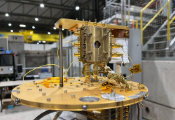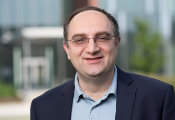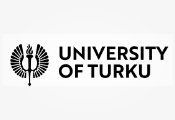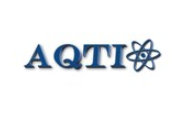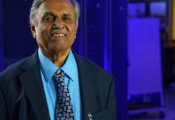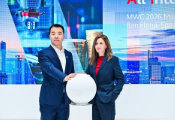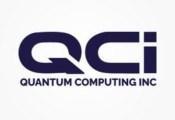How Argonne Is Helping to Expand the Quantum Prairie
September 17, 2025 -- California’s Silicon Valley is well known as the innovation hot spot that ushered in the digital era. Now, in the Midwest, a new vanguard is taking shape: the Quantum Prairie. Computing giants and startups alike are setting up shop in Illinois, home to the U.S. Department of Energy’s (DOE) Argonne National Laboratory and a constellation of other key institutions for quantum information science.
The principles of quantum physics were uncovered a century ago, and now researchers are harnessing nature’s quantum properties to advance computing, medicine, finance and other fields. The physics of matter at the atomic scale is being exploited to build ultrasensitive sensors and create intricate simulations of a variety of physical phenomena.
“The pace of scientific discovery is truly remarkable, and the levels of global engagement have dramatically increased,” said David Awschalom, the Quantum Information Science and Technology group leader at Argonne, professor at the University of Chicago and director of Q-NEXT, a DOE National Quantum Information Science Research Center led by Argonne. “Quantum science is rapidly becoming a technology that will have both economic and security implications.”
Argonne is accelerating quantum information science in multiple ways, including creating materials for qubits, which are units of quantum data, and helping to build testbeds for quantum technology such as ARQNET, InterQnet, the Chicago Quantum Network and the Chicago Quantum Computing Testbed. At Argonne, the upgraded Advanced Photon Source (APS), the Center for Nanoscale Materials and the Argonne Leadership Computing Facility (ALCF) — all DOE Office of Science user facilities — have enabled such breakthroughs. In 2023, the Argonne Quantum Foundry was launched to develop scalable semiconductor quantum systems.
“Building quantum information systems requires new materials, different computing architectures, specialized devices and software. You need to look at how quantum computers will communicate with one another and also how they will connect to classical computer systems,” said Argonne Distinguished Fellow Michael Norman, director of the Argonne Quantum Institute. “At Argonne, we’re doing all of it.”
But the lab’s homegrown capabilities are only part of its role as a key player in a growing Midwestern quantum ecosystem. Through Q-NEXT, Argonne spearheads collaboration on quantum technologies. It is a founding member of both the Chicago Quantum Exchange, a University of Chicago-based community of more than 50 corporate, international, nonprofit and regional partners that launched and nurtured the Illinois-Wisconsin-Indiana quantum ecosystem, and Duality, the nation’s first quantum startup accelerator.
Argonne is also a key part of two federal designations: the Bloch Quantum Tech Hub, which was designated by the U.S. Economic Development Administration, and Quantum Connected, a Midwest coalition that is a National Science Foundation Regional Innovation Engine (NSF Engines) Development Awardee and a semifinalist in the national NSF Engines competition. And Argonne Laboratory Director Paul Kearns is on the Board of Managers for the Illinois Quantum and Microelectronics Park (IQMP), an in-progress campus in Chicago for quantum technology and microelectronics innovation.
The allure of Illinois for quantum tech
Building on this foundation, Illinois has announced multiple quantum technology initiatives and partnerships in an effort to make Illinois a global quantum capital. In 2024, the state and IBM announced the National Quantum Algorithm Center, which will be located at the IQMP, and quantum computing company PsiQuantum has signed on as the anchor IQMP tenant.
IQMP Executive Director and CEO Harley Johnson, who is also a professor of mechanical science and engineering at the University of Illinois Urbana-Champaign, points to the state’s research bona fides: top schools such as his employer, along with the University of Chicago and Northwestern University; two DOE national labs, Argonne and Fermi National Accelerator Laboratory, which also head up two of the five DOE National Quantum Information Science Research Centers; and a partnership with the U.S. Department of Defense, part of the larger Quantum Benchmarking Initiative (QBI), to be a “national proving ground” for quantum. Argonne is leading several of the teams vetting quantum computing companies for the QBI.
“That’s an incredible base to build on,” Johnson said. “Then, when you add the state government, nonprofits, economic development organizations and the companies that are already here, there’s a strong ‘team Illinois’ environment that comes across to potential partners. They see that we’re pulling in the same direction.”
Preeti Chalsani, chief quantum officer at the public-private economic development partnership Intersect Illinois, said that when she participates in conferences, she hears talk of other states that want to replicate Illinois’ success in kickstarting the quantum industry.
“It’s not accidental that quantum is strong here,” Chalsani said, pointing to the state’s storied, multidisciplinary research history and assets such as Argonne’s APS and the ALCF, with its Aurora exascale computer. “Chicago and Illinois have done a really good job making researchers aware of quantum as not just a research enterprise, but a whole industry with lots of opportunities to collaborate.”
An ecosystem for quantum
The breadth of Argonne’s work in quantum information science, combined with the field’s increasing relevance, led the laboratory to create the Argonne Quantum Institute in October 2023. The institute coordinates research efforts both internally at the lab and with external partners, such as IBM, Infleqtion, Intel, Quantinuum and JPMorgan Chase. A recent article in Nature showcases the work of the latter two companies with Argonne scientists. Several scientists at the UChicago Pritzker School of Molecular Engineering, which has a core focus on quantum information research, conduct their work jointly at Argonne. The two institutions share several quantum-focused research initiatives as well.
The institute organizes quantum information research across four themes: computing and simulations; matter and materials; communications and networking; and quantum detecting and sensing. Recently, Argonne researchers developed an approach for controlling the collective magnetic properties of atoms in real time, which could be useful in quantum computers. Others are building qubits known as color centers at the Argonne Quantum Foundry.
“The fact that Argonne invests in the Quantum Foundry as a way to atomically engineer and construct materials has taken us from relying on external sources to provide materials over periods of months to performing everything inhouse within a day,” Awschalom said.
Some of the scientists working at Argonne are entrepreneurs who are building quantum companies with support from the lab’s two-year fellowship program, Chain Reaction Innovations. Founders of startups including memQ and Super.tech are Chain Reaction Innovations alumni. Quantum accelerator Duality, based at the University of Chicago and with Argonne as a founding partner, also provides funding and expertise to accepted startups. Both programs help connect entrepreneurs to the region’s larger quantum community and industry base.
“A lot of the work of startups relies on connections to research labs,” Chalsani said. “It also depends on connections to larger companies who could be strategic partners that can help with their product development or go-to-market strategy, or customers who would adopt their technologies. This work really cannot be done in isolation.”
Building the quantum workforce
The key to a quantum future is a strong workforce. Argonne invests in the next generation of quantum scientists by hosting summer research experiences for undergraduates, who receive hands-on training at the Argonne Quantum Foundry. And Q-NEXT, for which Argonne is the lead laboratory, has supported more than 150 students and postdocs over the past five years.
These initiatives address the rapidly growing demand for professionals with quantum materials and computational expertise, reinforcing Argonne’s commitment to empowering future scientific leaders.
“Quantum science won’t advance without the next generation,” Norman said. “Giving students and early-career researchers real lab experience, good mentors and a solid foundation is how we’ll keep Argonne at the forefront of this field. Our efforts here have been enabled by both Chicago Quantum Exchange’s Open Quantum Initiative program and DOE’s Science Undergraduate Laboratory Internships.”
Even though quantum information science has been progressing steadily over the past decade, specialized graduate programs have only just begun to appear within the last five years or so. The University of Chicago introduced one of the first in the nation. The explosion of investment and innovation in quantum information science is creating demand for expertise.
“One of the biggest challenges in the field is not only the science and technology, it’s scaling the workforce at all levels to meet growing demand,” Awschalom said. “How do we create a sufficient supply of quantum engineers and technicians to innovate and build quantum technologies?”
The answer is not just people with advanced schooling. More than half of quantum technology jobs do not require a graduate degree.
“Several years ago, it was mostly research scientists with Ph.D.s or postdocs who were involved in quantum,” Chalsani said. “But as the industry has matured, it requires a whole range of other talent.” That includes equipment technicians, software engineers, HVAC installers and other key roles.
Some of the technologies this workforce will support are already here, such as quantum navigation sensors. Some, like quantum computing, are further off.
And others? We don’t know what they are yet.
“History has shown that whenever there are discontinuous changes in science and technology, the biggest impacts are the ones we’re not imagining in this conversation,” Awschalom said. “The trick is, will we be ready when they arrive? Because I guarantee you, they’re going to appear — they always do.”

